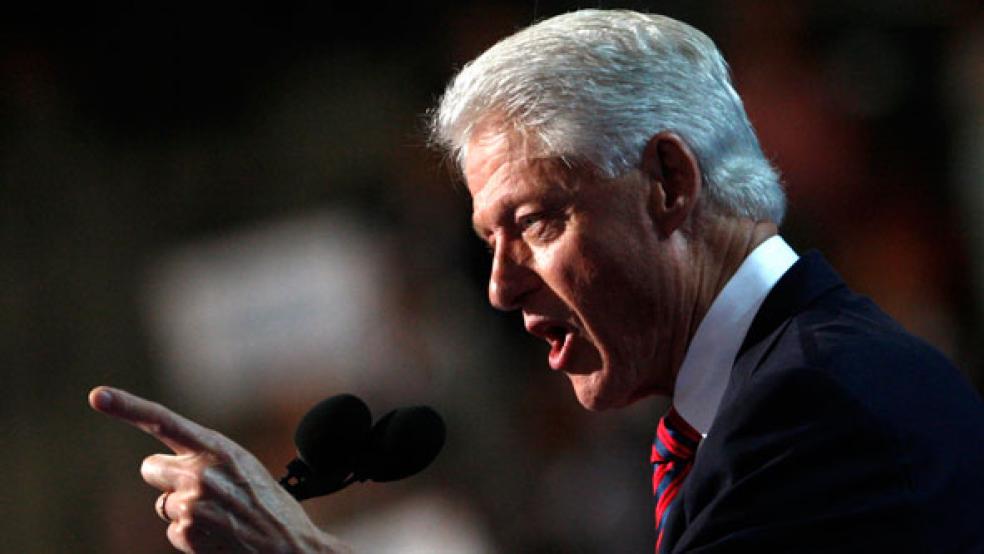Former President Bill Clinton made a case for Obama’s reelection on Wednesday night as complex as his own tenure in the White House: tightly focused but rambling, folksy yet wonkish, a call for unity that levied a barrage of criticism against Republicans.

At times, it seemed as though the saxophonist—freely improvising—would dissect the entire federal budget by each line item for delegates at the Democratic National Convention. His 50-minute monologue contained mouthfuls of sound bites, so many that it might very well have swallowed his message.
He essentially promised the American people a national renaissance that President Obama—who has struggled to revive the economy so far—would have to deliver in a second term. The man from Hope, Arkansas committed Obama to total audacity.
“If you want a future of shared prosperity, where the middle class is growing and poverty is declining, where the American Dream is alive and well, and where the United States remains the leading force for peace and prosperity in a highly competitive world, you should vote for Barack Obama,” Clinton said.
“So far every single person that has bet against America, has lost money -- because we always come back,” added the Comeback Kid, riffing off his own prepared remarks.His words pumped up the crowd in ways that discussion of policy minutiae almost never do.
He claimed middle class families whose children have down syndrome or autism would suffer from Medicaid cuts if Republican nominee Mitt Romney won the Oval Office. He chopped through the political calculus with budgetary arithmetic to argue that Medicare will go broke by 2016 under the Romney plan to repeal Obamacare. Child nutrition, welfare-to-work, airline safety, and college loans were each wedged into his speech.
The former president, who left office in 2001, filled the void of details in Romney’s proposals with his own argument. The Republican nominee pledges to trim tax rates, increase military spending, and reduce the budget deficit without quite revealing how this trick would be accomplished. Americans would pay the price for that alchemy in one way or another, Clinton said.
The Romney campaign Twitter feed was noticeably silent amid the verbosity. Joe Pounder, research director for the Republican National Committee, fired back that Obama had already failed to fulfill the aspirations that accompanied his ascendancy back in 2008.
“Remember, Barack Obama said if he didn't have the economy fixed in three years, this would be a one-term proposition,” Pounder tweeted.
The economy remains in shambles. Unemployment has stayed above 8 percent for the past 42 months, the longest streak since the government began tracking the figure in 2008. The national debt has ballooned to the size of the gross domestic product, a $16 trillion obligation largely fueled by the massive budget deficits meant to restore a country crushed by the 2008 financial crisis.
“No president— not me or any of my predecessors could have repaired all the damage in just four years,” Clinton said. “But conditions are improving and if you'll renew the President's contract you will feel it.”
Yet the problem with the vows proffered by Clinton’s speech is political in nature. He hailed Obama as a president willing to compromise, yet he could not explain what incentive would be dangled before the GOP to break the gridlock of the past two years. Even if Obama secures a second term, he will still be forced to reckon with the Republican majority in the House of Representatives in order to honor the assurances given by Clinton.
In his own 1996 reelection speech at the Democratic convention, Clinton envisioned a “bridge to the 21st century” made possible by cooperation between government and business, and a partnership between Republicans and Democrats.
“We can only build our bridge to the 21st century if we build it together, and if we're willing to walk arm-in-arm across that bridge together,” commented the president who would be impeached by House Republicans two years later.
The bridge ended up landing on a fractured shore, and the ground has only become rockier since. Perhaps the only question not addressed by Clinton’s soliloquy was how Obama could smooth the way with a Republican party that—by the former president’s own admission—cast out lawmakers who were willing to compromise.
All Clinton could do is confirm that a genuine divide exists between two parties devoted to their principles.
“When times are tough, constant conflict may be good politics but in the real world, cooperation works better,” he said. “After all, nobody's right all the time, and a broken clock is right twice a day. All of us are destined to live our lives between those two extremes.”




